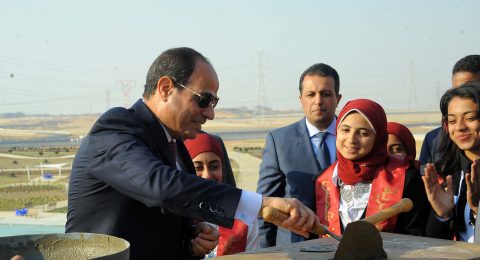The long-awaited New Administrative Capital has come to light with President Abdel Fattah El Sisi inaugurating its first phase late October, Invest-Gate reports.
Set to be a facelift to many Egyptian governmental headquarters and many ministerial buildings, the New Administrative Capital is currently open for housing and commercial projects as well.
An adviser to the New Administrative Capital company confirms, “The government plans to relocate its institutions to the new capital by 2019.”
The first phase of the New Capital, which spans 40,000 feddan, includes the R3 Residential District. The district comprises 25,400 residential and commercial units, 25,000 units of which are still at different stages of construction to include apartments and villas.

Egyptian President Abdel Fattah El Sisi inaugurating the New Administrative Capital
Among this first phase is the Business District, featuring 20 buildings that include the tallest tower in Africa, scheduled for completion by 2020.
“The First phase also comprises ministerial buildings, housing 29 ministries; in addition to, new headquarters of the parliament,” Head of the Armed Forces Engineering Authority Kamel Al-Wazir said during a conference held on the ocassion of the inauguration.
Al-Wazir also revealed that the capital’s new international airport is completed and ready for operation.
Within the inaugurated phase is Al-Massa Capital Hotel, which has been concluded and inaugurated in a major celebration held at the hotel, coinciding with the 44th anniversary of the 6th October War victory.
The hotel is constructed by the Armed Forces Engineering Authority. It is the first hotel to be finished at the new capital, featuring a resort, a lake and a huge conference hall.
Housing Minister Mostafa Madbouly described the- 170,000- feddan- new city, launched back in May 2016, as a “fulcrum” between Cairo and the Suez Canal Area Development Project.”
The new capital will depend on renewable resources and will comprise 20 residential districts “that can accommodate 6.5 mn people, with units available for all social classes,” Madbouly confirmed.
In a previous interview with BBC, Madbouly revealed that the mega project will cost USD 45 bn and is scheduled to be completed in 2022.
The new capital, according to Madbouly, is characterized by a 35- kilometer- green river area that makes use of treated wastewater and comprises a number of gardens with restaurants, an amusement park, and an open theater.
Madbouly also uncovered plans for the construction of a new electric train between Al-Salam City and the new capital, as well as, a high-speed train, connecting Ain Sokhna with the new capital, 6th of October district, Al-Alamein, and Alexandria.
China is establishing the electric train with 11 stops, and providing the wagons with a -USD 740 mn- loan, to be repaid throughout 15 years, with a grace period of five years.
The construction of the electric train was scheduled to take three years, but Egyptian President had urged the Chinese company to reduce the period to two years instead.
The Chinese investments in the New Administrative Capital included USD 3.2 bn to be invested in the second phase of the project, Osama Magdoub, Egypt’s Ambassador to China previously revealed in a televised interview. Moreover, he confirmed that investments worth USD 8 bn will be implemented in the new capital over the next 10 years.

Minister of Housing signing the Chinese deal
Chairman of the New Administrative City Major General Ahmed Zaki Abdeen previously told CBC, an Egyptian private channel, “The New Administrative City is a long awaited dream finally coming true.”
“Former President Anwar El Sadat had suggested this idea in order to solve the congestion in Cairo,” he recalled.
“The planning of the New Administrative City is very accurate… the sources of its success do exist, as it is an investment project that will yield a return on the country and many investors are eyeing it.”
He added, “The city will not have a financial burden on the country as the city located in a unique place that is surrounded by all proper infrastructure, making it attractive to investors.”
“We have to move in parallel directions to achieve the development plan… we also have demands on establishing 12 universities in the new capital,” he concluded.
The new capital is closer to the design of Singapore with a vision to make the city host more than just governmental buildings. “The New Administrative Capital is to become a fully- integrated city,” according to Ayman Ismail, adviser to Board of Directors at the New Administrative City.